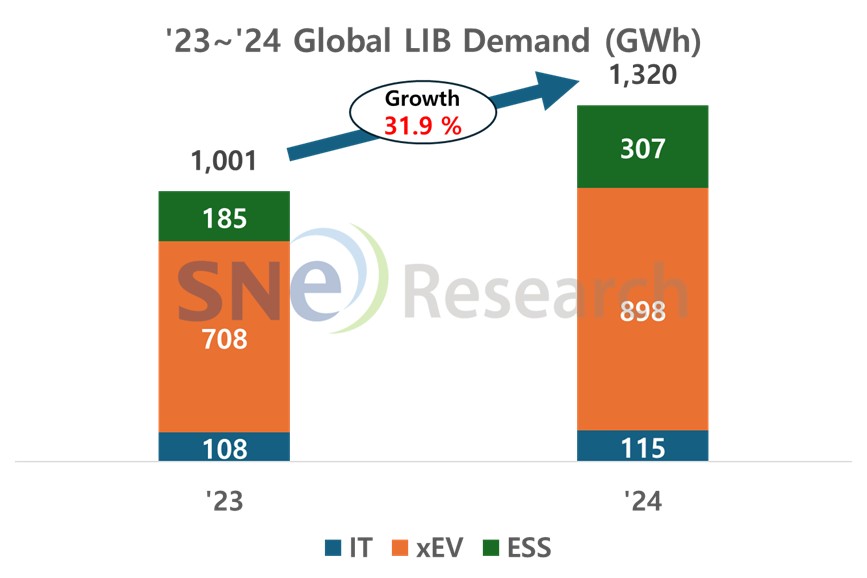In 2024, LIB Demand Reached 1.3 TWh[1], 32% Up from Previous Year
In 2024,
the global demand for lithium-ion batteries was 1.3 TWh.
According to the report, 2025 Global LIB Mid/Long-term Outlook by Application,’ released by SNE Research, the global demand for lithium-ion batteries in 2024 was 1,320 GWh, which was 31.9% up from the previous year.
Demand for LIB can be categorized into those for ESS, LIB for EVs, and small-sized batteries used in laptops, smartphones, etc. The growth of LIB market in its nascent stage was centered on the market for IT devices. However, with the electric vehicle market and ESS market rapidly growing, mid/large-sized LIBs started to take up a larger portion.
If we look at demand for lithium-ion batteries in 2024 by application, demand for IT devices was 115 GWh, those for electric vehicles was 898 GWh, and 307 GWh for ESS.
Demand for lithium-ion batteries used in IT devices was largely affected by the growth of demand for lithium-ion batteries used for smartphones. As foldable smartphones are getting popular and more lithium-ion batteries with Si-anode material are used, the amount of energy in smartphones showed a significant increase. Those foldable smartphones made in China have lithium-ion batteries with high energy amount.
The market of lithium-ion batteries for electric vehicles saw a massive growth in China which has been leading the growth of entire market. IN 2024, the LIB for EV market in China grew approximately 40% from the previous year.
The LIB for ESS market was mainly focused on those in power grid. In the entire ESS LIB market, ESS LIB for power grid took up 72% in 2023 and 80 % in 2024. It is expected that ESS LIB for power grid would account for more than 83% of market share onwards.
SNE Research forecasted that demand for lithium-ion batteries in small-sized IT devices is expected to 200 GWh with small-sized LIBs used in various applications. The entire demand for lithium-ion batteries used across all the applications is forecasted to reach 5.6 TWh in 2035.

[1] TWh refers to Terawatt-hour; 1 TWh is equivalent to 1,000 GWh.

